Analysis of Freud's Theories: Unconscious, Psychosexual Stages
VerifiedAdded on 2023/06/14
|5
|1312
|275
Essay
AI Summary
This essay critically examines Sigmund Freud's theories on the unconscious mind, psychosexual stages of development, and the structure of personality. The author agrees with Freud's concept of the unconscious mind and its influence on behavior but disagrees with the psychosexual stages of development due to the lack of empirical evidence and overemphasis on sexuality. The essay also acknowledges the limitations of Freud's personality theory, particularly its focus on sexuality and neglect of environmental and cultural factors. The author concludes by appreciating Freud's contributions to psychology while highlighting areas for further substantiation and consideration.
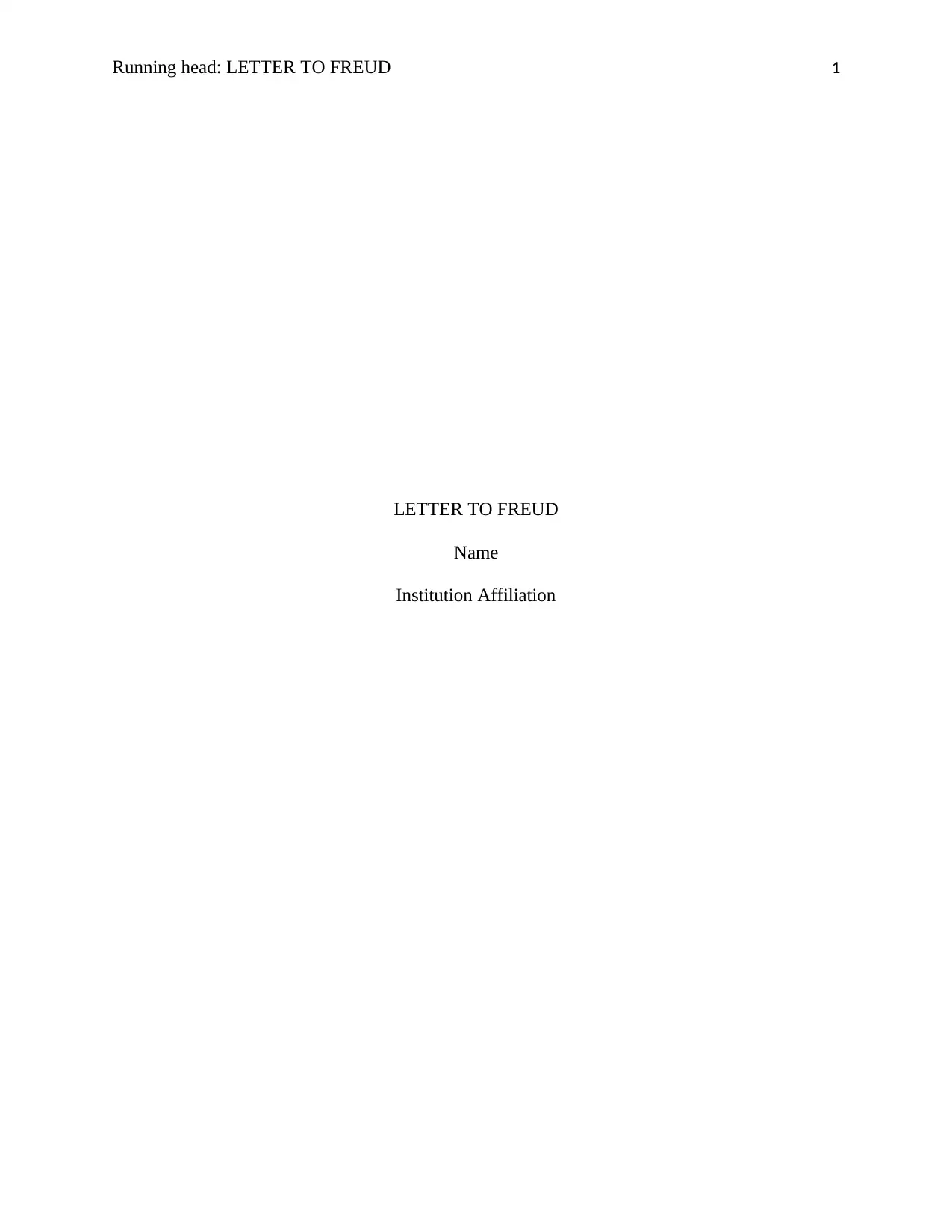
Running head: LETTER TO FREUD 1
LETTER TO FREUD
Name
Institution Affiliation
LETTER TO FREUD
Name
Institution Affiliation
Paraphrase This Document
Need a fresh take? Get an instant paraphrase of this document with our AI Paraphraser
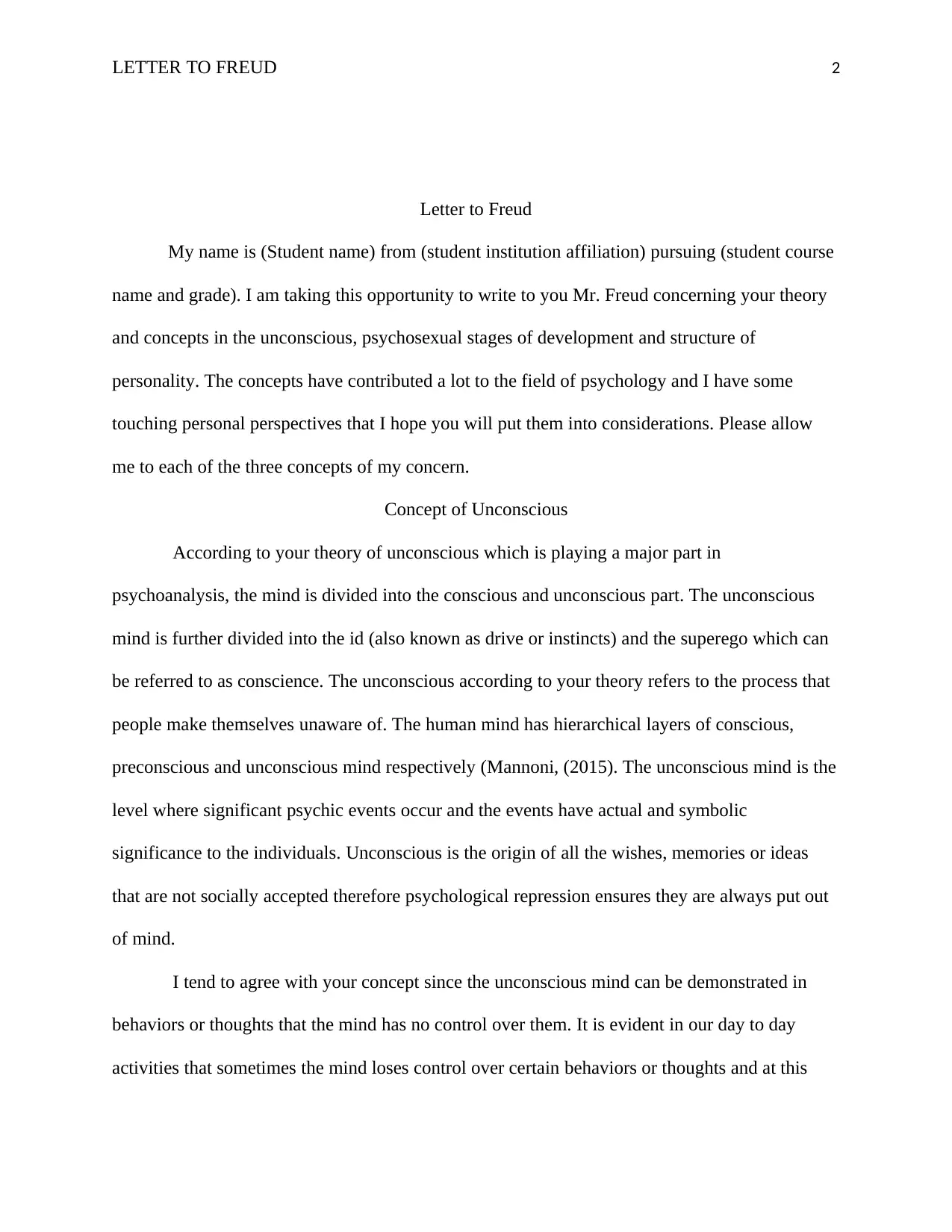
LETTER TO FREUD 2
Letter to Freud
My name is (Student name) from (student institution affiliation) pursuing (student course
name and grade). I am taking this opportunity to write to you Mr. Freud concerning your theory
and concepts in the unconscious, psychosexual stages of development and structure of
personality. The concepts have contributed a lot to the field of psychology and I have some
touching personal perspectives that I hope you will put them into considerations. Please allow
me to each of the three concepts of my concern.
Concept of Unconscious
According to your theory of unconscious which is playing a major part in
psychoanalysis, the mind is divided into the conscious and unconscious part. The unconscious
mind is further divided into the id (also known as drive or instincts) and the superego which can
be referred to as conscience. The unconscious according to your theory refers to the process that
people make themselves unaware of. The human mind has hierarchical layers of conscious,
preconscious and unconscious mind respectively (Mannoni, (2015). The unconscious mind is the
level where significant psychic events occur and the events have actual and symbolic
significance to the individuals. Unconscious is the origin of all the wishes, memories or ideas
that are not socially accepted therefore psychological repression ensures they are always put out
of mind.
I tend to agree with your concept since the unconscious mind can be demonstrated in
behaviors or thoughts that the mind has no control over them. It is evident in our day to day
activities that sometimes the mind loses control over certain behaviors or thoughts and at this
Letter to Freud
My name is (Student name) from (student institution affiliation) pursuing (student course
name and grade). I am taking this opportunity to write to you Mr. Freud concerning your theory
and concepts in the unconscious, psychosexual stages of development and structure of
personality. The concepts have contributed a lot to the field of psychology and I have some
touching personal perspectives that I hope you will put them into considerations. Please allow
me to each of the three concepts of my concern.
Concept of Unconscious
According to your theory of unconscious which is playing a major part in
psychoanalysis, the mind is divided into the conscious and unconscious part. The unconscious
mind is further divided into the id (also known as drive or instincts) and the superego which can
be referred to as conscience. The unconscious according to your theory refers to the process that
people make themselves unaware of. The human mind has hierarchical layers of conscious,
preconscious and unconscious mind respectively (Mannoni, (2015). The unconscious mind is the
level where significant psychic events occur and the events have actual and symbolic
significance to the individuals. Unconscious is the origin of all the wishes, memories or ideas
that are not socially accepted therefore psychological repression ensures they are always put out
of mind.
I tend to agree with your concept since the unconscious mind can be demonstrated in
behaviors or thoughts that the mind has no control over them. It is evident in our day to day
activities that sometimes the mind loses control over certain behaviors or thoughts and at this
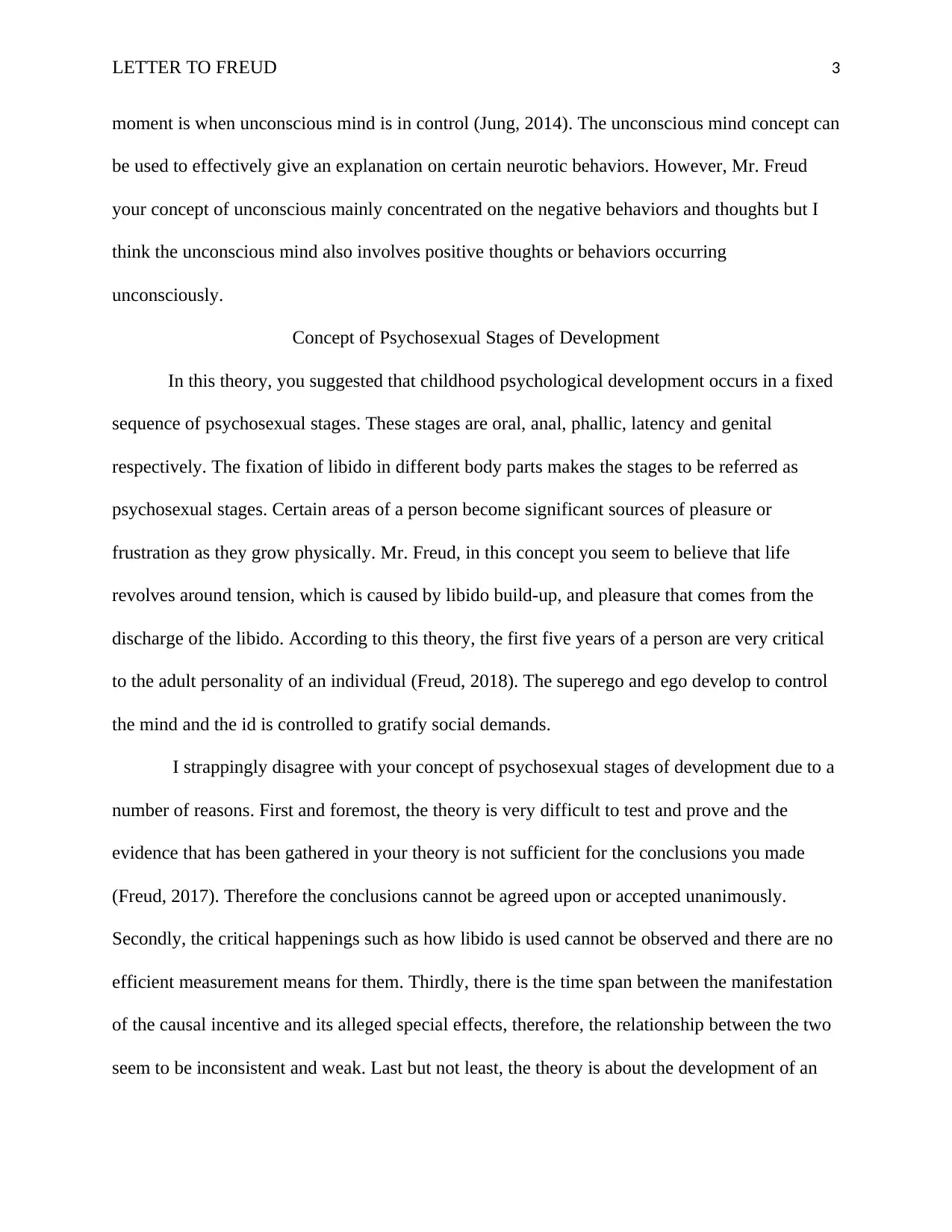
LETTER TO FREUD 3
moment is when unconscious mind is in control (Jung, 2014). The unconscious mind concept can
be used to effectively give an explanation on certain neurotic behaviors. However, Mr. Freud
your concept of unconscious mainly concentrated on the negative behaviors and thoughts but I
think the unconscious mind also involves positive thoughts or behaviors occurring
unconsciously.
Concept of Psychosexual Stages of Development
In this theory, you suggested that childhood psychological development occurs in a fixed
sequence of psychosexual stages. These stages are oral, anal, phallic, latency and genital
respectively. The fixation of libido in different body parts makes the stages to be referred as
psychosexual stages. Certain areas of a person become significant sources of pleasure or
frustration as they grow physically. Mr. Freud, in this concept you seem to believe that life
revolves around tension, which is caused by libido build-up, and pleasure that comes from the
discharge of the libido. According to this theory, the first five years of a person are very critical
to the adult personality of an individual (Freud, 2018). The superego and ego develop to control
the mind and the id is controlled to gratify social demands.
I strappingly disagree with your concept of psychosexual stages of development due to a
number of reasons. First and foremost, the theory is very difficult to test and prove and the
evidence that has been gathered in your theory is not sufficient for the conclusions you made
(Freud, 2017). Therefore the conclusions cannot be agreed upon or accepted unanimously.
Secondly, the critical happenings such as how libido is used cannot be observed and there are no
efficient measurement means for them. Thirdly, there is the time span between the manifestation
of the causal incentive and its alleged special effects, therefore, the relationship between the two
seem to be inconsistent and weak. Last but not least, the theory is about the development of an
moment is when unconscious mind is in control (Jung, 2014). The unconscious mind concept can
be used to effectively give an explanation on certain neurotic behaviors. However, Mr. Freud
your concept of unconscious mainly concentrated on the negative behaviors and thoughts but I
think the unconscious mind also involves positive thoughts or behaviors occurring
unconsciously.
Concept of Psychosexual Stages of Development
In this theory, you suggested that childhood psychological development occurs in a fixed
sequence of psychosexual stages. These stages are oral, anal, phallic, latency and genital
respectively. The fixation of libido in different body parts makes the stages to be referred as
psychosexual stages. Certain areas of a person become significant sources of pleasure or
frustration as they grow physically. Mr. Freud, in this concept you seem to believe that life
revolves around tension, which is caused by libido build-up, and pleasure that comes from the
discharge of the libido. According to this theory, the first five years of a person are very critical
to the adult personality of an individual (Freud, 2018). The superego and ego develop to control
the mind and the id is controlled to gratify social demands.
I strappingly disagree with your concept of psychosexual stages of development due to a
number of reasons. First and foremost, the theory is very difficult to test and prove and the
evidence that has been gathered in your theory is not sufficient for the conclusions you made
(Freud, 2017). Therefore the conclusions cannot be agreed upon or accepted unanimously.
Secondly, the critical happenings such as how libido is used cannot be observed and there are no
efficient measurement means for them. Thirdly, there is the time span between the manifestation
of the causal incentive and its alleged special effects, therefore, the relationship between the two
seem to be inconsistent and weak. Last but not least, the theory is about the development of an
⊘ This is a preview!⊘
Do you want full access?
Subscribe today to unlock all pages.

Trusted by 1+ million students worldwide
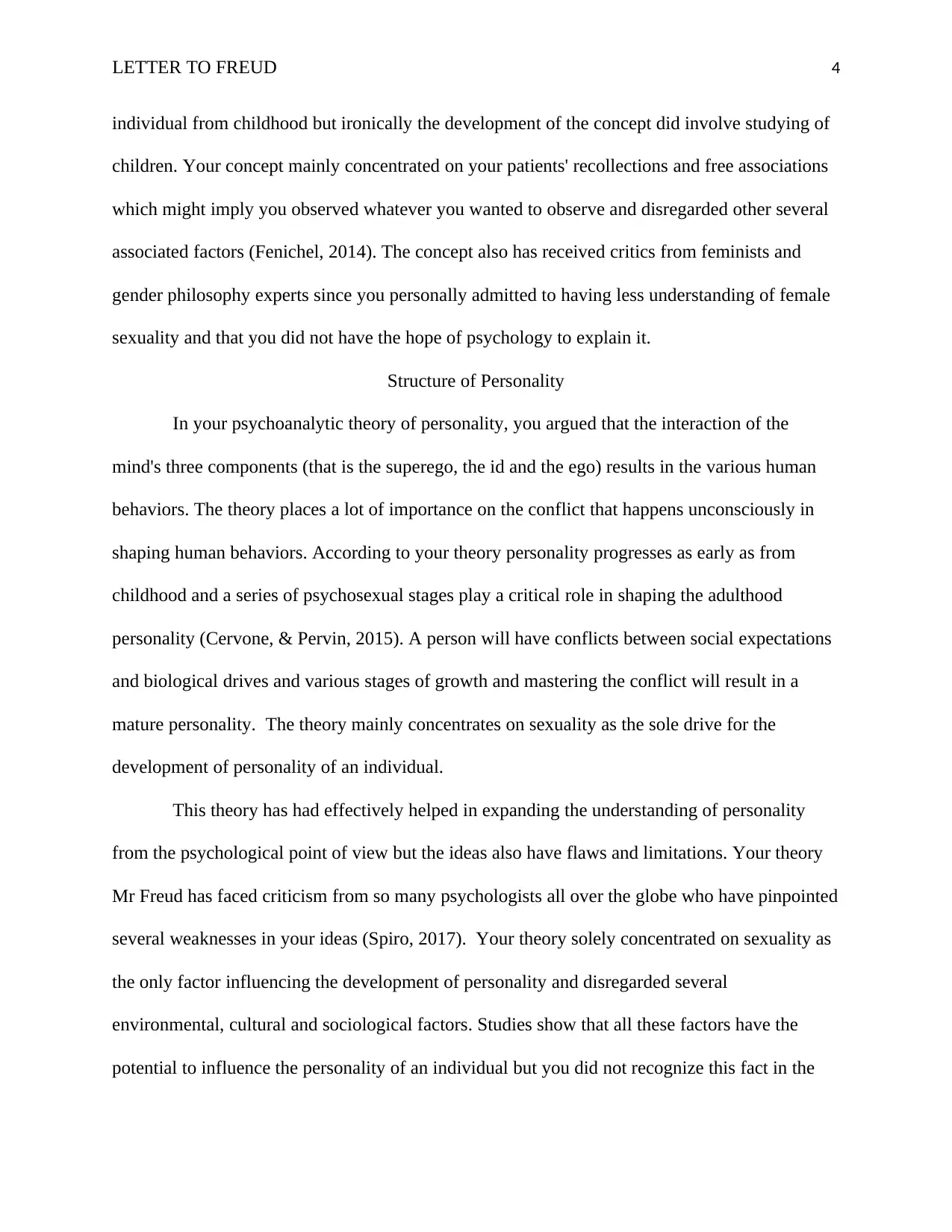
LETTER TO FREUD 4
individual from childhood but ironically the development of the concept did involve studying of
children. Your concept mainly concentrated on your patients' recollections and free associations
which might imply you observed whatever you wanted to observe and disregarded other several
associated factors (Fenichel, 2014). The concept also has received critics from feminists and
gender philosophy experts since you personally admitted to having less understanding of female
sexuality and that you did not have the hope of psychology to explain it.
Structure of Personality
In your psychoanalytic theory of personality, you argued that the interaction of the
mind's three components (that is the superego, the id and the ego) results in the various human
behaviors. The theory places a lot of importance on the conflict that happens unconsciously in
shaping human behaviors. According to your theory personality progresses as early as from
childhood and a series of psychosexual stages play a critical role in shaping the adulthood
personality (Cervone, & Pervin, 2015). A person will have conflicts between social expectations
and biological drives and various stages of growth and mastering the conflict will result in a
mature personality. The theory mainly concentrates on sexuality as the sole drive for the
development of personality of an individual.
This theory has had effectively helped in expanding the understanding of personality
from the psychological point of view but the ideas also have flaws and limitations. Your theory
Mr Freud has faced criticism from so many psychologists all over the globe who have pinpointed
several weaknesses in your ideas (Spiro, 2017). Your theory solely concentrated on sexuality as
the only factor influencing the development of personality and disregarded several
environmental, cultural and sociological factors. Studies show that all these factors have the
potential to influence the personality of an individual but you did not recognize this fact in the
individual from childhood but ironically the development of the concept did involve studying of
children. Your concept mainly concentrated on your patients' recollections and free associations
which might imply you observed whatever you wanted to observe and disregarded other several
associated factors (Fenichel, 2014). The concept also has received critics from feminists and
gender philosophy experts since you personally admitted to having less understanding of female
sexuality and that you did not have the hope of psychology to explain it.
Structure of Personality
In your psychoanalytic theory of personality, you argued that the interaction of the
mind's three components (that is the superego, the id and the ego) results in the various human
behaviors. The theory places a lot of importance on the conflict that happens unconsciously in
shaping human behaviors. According to your theory personality progresses as early as from
childhood and a series of psychosexual stages play a critical role in shaping the adulthood
personality (Cervone, & Pervin, 2015). A person will have conflicts between social expectations
and biological drives and various stages of growth and mastering the conflict will result in a
mature personality. The theory mainly concentrates on sexuality as the sole drive for the
development of personality of an individual.
This theory has had effectively helped in expanding the understanding of personality
from the psychological point of view but the ideas also have flaws and limitations. Your theory
Mr Freud has faced criticism from so many psychologists all over the globe who have pinpointed
several weaknesses in your ideas (Spiro, 2017). Your theory solely concentrated on sexuality as
the only factor influencing the development of personality and disregarded several
environmental, cultural and sociological factors. Studies show that all these factors have the
potential to influence the personality of an individual but you did not recognize this fact in the
Paraphrase This Document
Need a fresh take? Get an instant paraphrase of this document with our AI Paraphraser
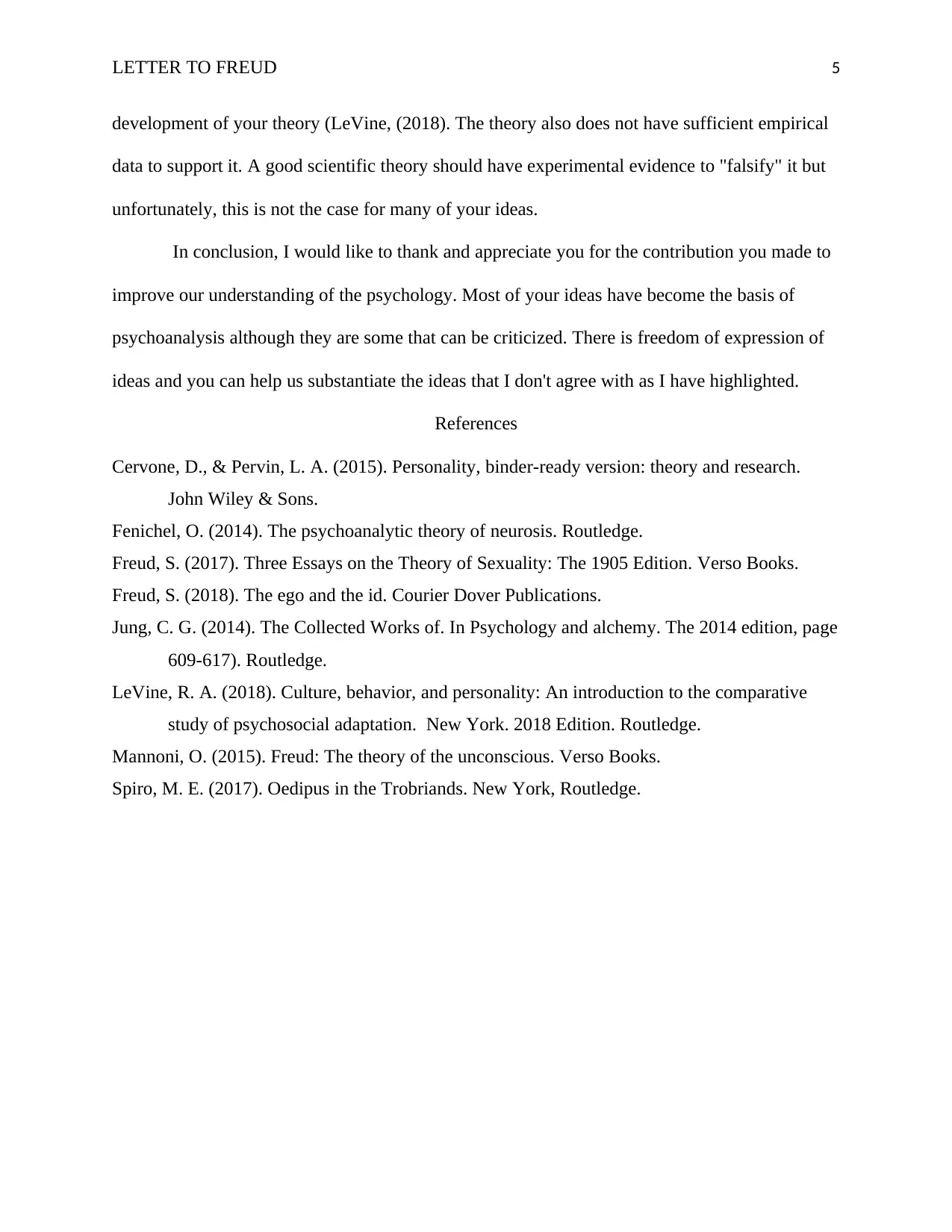
LETTER TO FREUD 5
development of your theory (LeVine, (2018). The theory also does not have sufficient empirical
data to support it. A good scientific theory should have experimental evidence to "falsify" it but
unfortunately, this is not the case for many of your ideas.
In conclusion, I would like to thank and appreciate you for the contribution you made to
improve our understanding of the psychology. Most of your ideas have become the basis of
psychoanalysis although they are some that can be criticized. There is freedom of expression of
ideas and you can help us substantiate the ideas that I don't agree with as I have highlighted.
References
Cervone, D., & Pervin, L. A. (2015). Personality, binder-ready version: theory and research.
John Wiley & Sons.
Fenichel, O. (2014). The psychoanalytic theory of neurosis. Routledge.
Freud, S. (2017). Three Essays on the Theory of Sexuality: The 1905 Edition. Verso Books.
Freud, S. (2018). The ego and the id. Courier Dover Publications.
Jung, C. G. (2014). The Collected Works of. In Psychology and alchemy. The 2014 edition, page
609-617). Routledge.
LeVine, R. A. (2018). Culture, behavior, and personality: An introduction to the comparative
study of psychosocial adaptation. New York. 2018 Edition. Routledge.
Mannoni, O. (2015). Freud: The theory of the unconscious. Verso Books.
Spiro, M. E. (2017). Oedipus in the Trobriands. New York, Routledge.
development of your theory (LeVine, (2018). The theory also does not have sufficient empirical
data to support it. A good scientific theory should have experimental evidence to "falsify" it but
unfortunately, this is not the case for many of your ideas.
In conclusion, I would like to thank and appreciate you for the contribution you made to
improve our understanding of the psychology. Most of your ideas have become the basis of
psychoanalysis although they are some that can be criticized. There is freedom of expression of
ideas and you can help us substantiate the ideas that I don't agree with as I have highlighted.
References
Cervone, D., & Pervin, L. A. (2015). Personality, binder-ready version: theory and research.
John Wiley & Sons.
Fenichel, O. (2014). The psychoanalytic theory of neurosis. Routledge.
Freud, S. (2017). Three Essays on the Theory of Sexuality: The 1905 Edition. Verso Books.
Freud, S. (2018). The ego and the id. Courier Dover Publications.
Jung, C. G. (2014). The Collected Works of. In Psychology and alchemy. The 2014 edition, page
609-617). Routledge.
LeVine, R. A. (2018). Culture, behavior, and personality: An introduction to the comparative
study of psychosocial adaptation. New York. 2018 Edition. Routledge.
Mannoni, O. (2015). Freud: The theory of the unconscious. Verso Books.
Spiro, M. E. (2017). Oedipus in the Trobriands. New York, Routledge.
1 out of 5
Related Documents
Your All-in-One AI-Powered Toolkit for Academic Success.
+13062052269
info@desklib.com
Available 24*7 on WhatsApp / Email
![[object Object]](/_next/static/media/star-bottom.7253800d.svg)
Unlock your academic potential
Copyright © 2020–2026 A2Z Services. All Rights Reserved. Developed and managed by ZUCOL.





